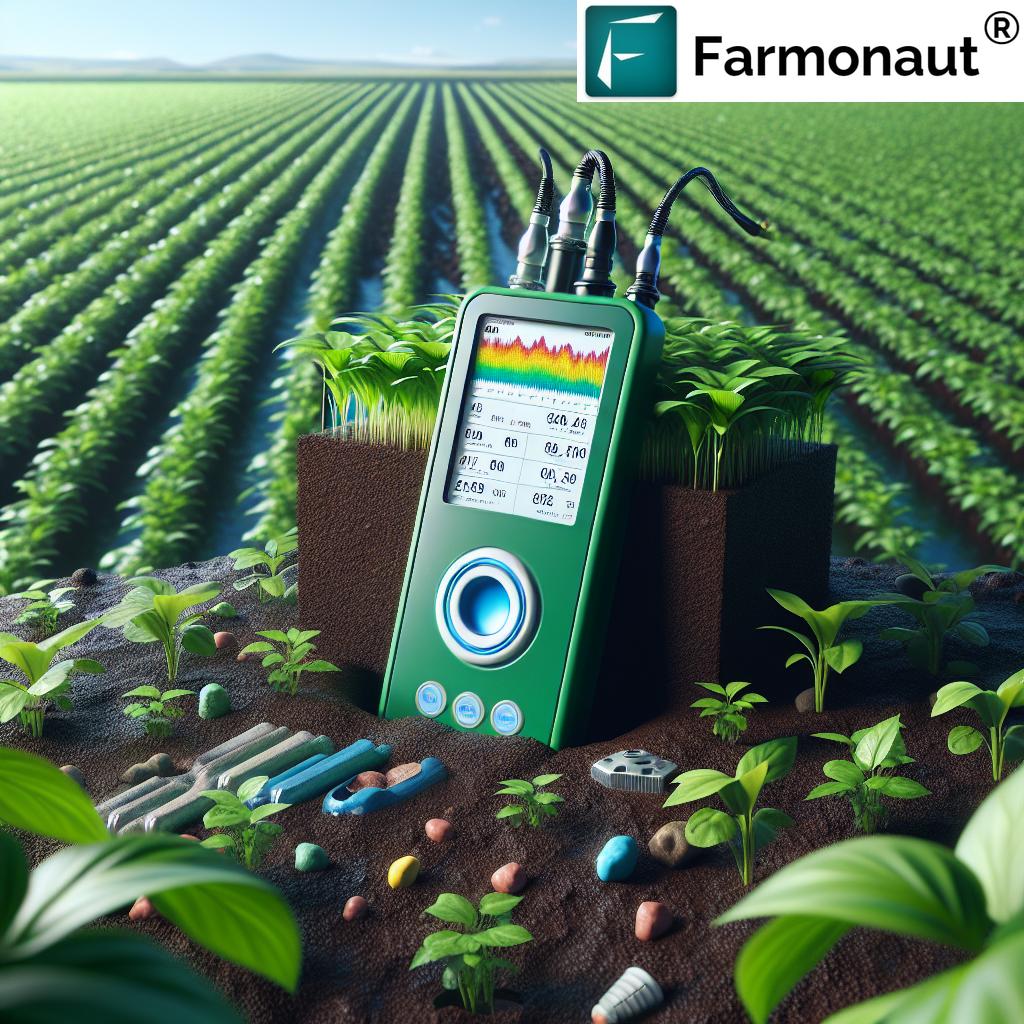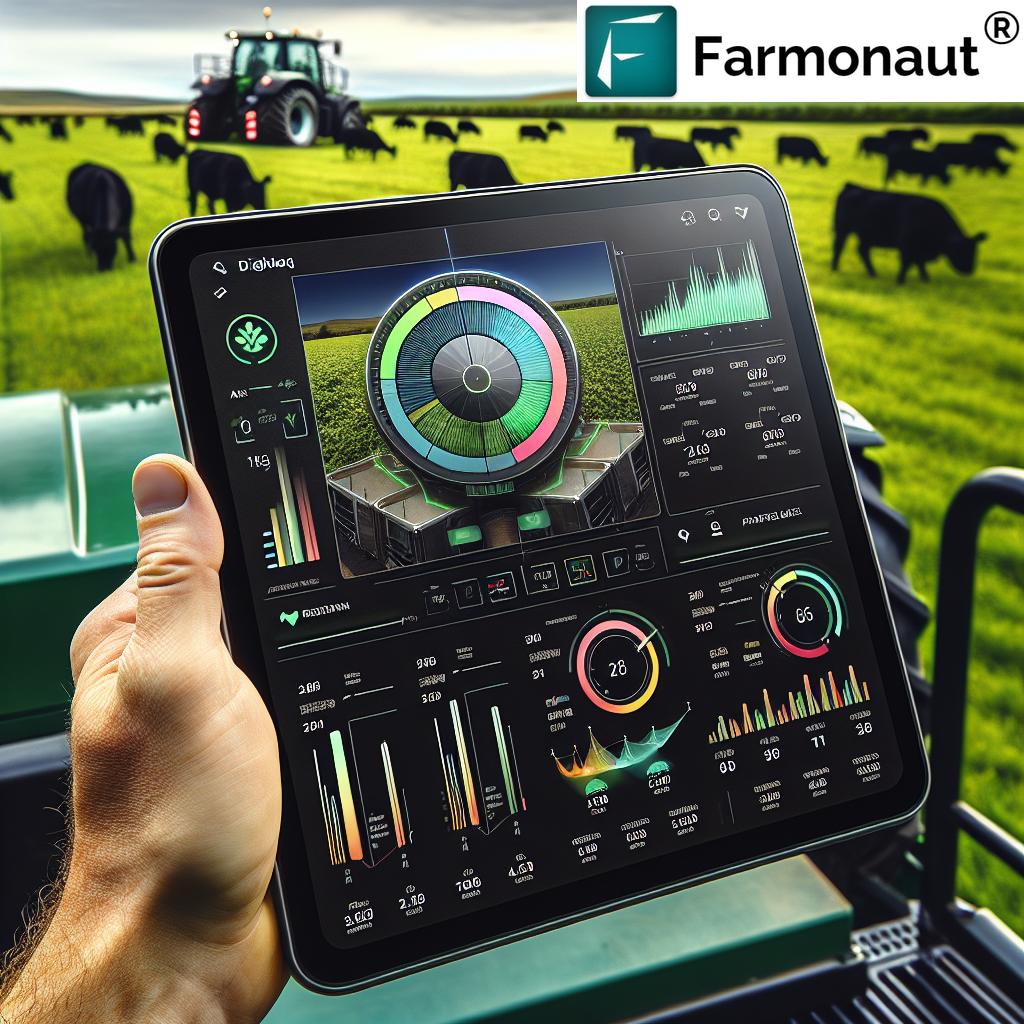Soil pH Meter: 7 Powerful Ways to Boost Crop Health & Yields
Summary: Soil pH is a critical factor influencing plant growth, water and nutrient uptake, and overall soil health. Utilizing modern soil pH meters, including digital solutions, empowers us to optimize soil nutrient management and make data-driven interventions for sustainable, high-yield agriculture. A soil pH meter provides rapid and accurate measurement of soil acidity and alkalinity, enabling precise crop and land management for farmers, horticulturists, and foresters alike.
“Soil pH meters can improve crop yields by up to 20% through precise nutrient management and timely soil adjustments.”
Understanding Soil pH: Basics, Scale, and Importance
As stewards of the land, it’s essential for us to recognize that soil pH is not just a number; it’s a core factor influencing plant growth, health, and yield. The pH value quantifies a soil’s acidity or alkalinity, measured on a 0 to 14 scale—with 7.0 as the “neutral” midpoint.
- Acidic soils: pH below 7 (higher hydrogen ion concentration), common in regions with high rainfall.
- Alkaline soils: pH above 7 (lower hydrogen ion concentration), often found where evaporation exceeds rainfall.
- Ideal range: Most crops thrive between pH 5.5 and 7.5. In this range, nutrients like nitrogen, phosphorus, and potassium are most accessible for plant uptake.
Key Insight: Small changes in pH change the availability and forms of essential nutrients.
For example, phosphorus becomes less available below pH 6.0 and above pH 7.5, leading to potential deficiencies—even if your soil test shows high phosphorus content.
Similarly, toxic elements (like aluminum) become more soluble in highly acidic soils, stunting root growth and affecting crop health.
This demonstrates why soil pH testing is fundamental in both conventional and precision agriculture for sustainable farming.
Main Benefits of Maintaining Optimal Soil pH
- Improved nutrient availability and plant growth
- Enhanced soil structure, drainage, and water infiltration
- Healthy soil microbial activity for decomposition and nutrient cycling
- Prevention of toxic element accumulation
- Greater resistance to crop diseases and environmental stresses
Why Soil pH Changes
- Natural soil formation and parent rock material
- Local rainfall and irrigation practices
- Application of fertilizers, manure, or lime
- Plant type and root exudates
- Pollution, acid rain, and industrial or agricultural chemicals
Routine monitoring and corrective management via a reliable soil pH meter are thus essential to farming success.
The Role of Soil pH Meters in Precision Agriculture
Soil pH meters are innovative tools designed to measure and monitor the hydrogen ion concentration in the soil. These instruments empower us to quickly evaluate current soil acidity or alkalinity, informing our crop management strategies with real-time, actionable data.
- Available as analog, digital, or smart/app-enabled devices
- Typically involve a probe inserted into the soil, with a digital model displaying immediate results
- Advanced devices measure additional parameters—such as soil moisture, temperature, and even electrical conductivity
Digital pH meter for agriculture solutions are increasingly preferred for their rapid, highly accurate, and easy-to-log measurements, ensuring quicker remediation for pH imbalances.
Accurate measurement is the foundation of soil pH management in crop production, sustainable practices, and optimal resource use.
Let’s now explore the “7 Powerful Ways” a soil pH meter drives crop health, yield, and agricultural sustainability.
7 Powerful Ways Soil pH Meters Can Boost Crop Health & Yields
1. Soil Analysis & Fertilizer Management
For optimal results, we must regularly conduct soil analysis and soil pH testing as part of nutrient management. A soil pH meter:
- Identifies nutrient lockup—detecting when crucial elements are chemically inaccessible.
- Reveals whether corrective amendments, like lime (for acidic soils) or sulfur (for alkaline soils), are needed.
- Guides fertilizer application rates and timing, reducing both financial and environmental waste.
- Helps avoid over-application, which could distort soil pH and pollute local ecosystems .
Precision in soil pH measurement ensures that applied nitrogen, phosphorus, potassium, and trace elements remain in plant-available forms—minimizing losses, maximizing yields, and promoting soil health by preserving microbial life.
2. Crop Suitability & Rotation Planning
Many of us overlook the fact that different crops, trees, and plants have distinct pH preferences. For example:
- Blueberries & potatoes prefer acidic soils (pH 4.5-6.0)
- Alfalfa & most vegetables thrive better in near-neutral soils (pH 6.5-7.5)
- Barley & sunflower are more tolerant of alkaline conditions
With a soil pH meter, we:
- Select crops suited for prevailing soil pH, reducing the risk of low yields or disease susceptibility.
- Intelligently plan crop rotation to maintain balanced pH levels—improving soil health, reducing pest buildup, and supporting long-term sustainability.
Crop suitability analysis thus becomes data-driven, optimizing both immediate and future productivity.
3. Soil Health Monitoring & Change Detection
A crucial part of sustainable agriculture involves periodic soil health monitoring using a reliable soil pH meter. Here’s why:
- Regular readings allow us to track changes—detecting trends due to fertilizer use, rainfall, or crop selection.
- Early warnings: Sudden drops in pH may indicate soil degradation, acidic water ingress, or nutrient imbalances. Early detection allows timely remediation.
- Long-term assessment: A neutral pH range supports beneficial microorganisms, effective organic matter breakdown, and healthy plant growth.
By consistently monitoring pH at representative locations and depths, we uphold the integrity of our soil conditions and preemptively adjust management practices to support sustainability.
“Digital soil pH testing reduces analysis time by 70%, enabling faster, data-driven decisions for sustainable agriculture.”
4. Irrigation Management & Water Quality Control
The pH of soils has a strong influence on their drainage properties, water-holding capacity, and permeability:
- Compacted or poorly drained soils may exhibit abnormal pH due to lack of oxygenation or chemical buildup.
- Water sources with improper pH (from alkaline irrigation or polluted runoff) can shift soil pH and degrade soil structure.
By deploying a soil pH meter and, if necessary, a digital pH meter for agriculture, we can:
- Monitor the pH of irrigation water—ensuring it does not harm the soil ecosystem or crop quality.
- Diagnose waterlogging or compaction issues by identifying associated pH imbalances.
- Fine-tune irrigation for optimal water use efficiency and root health.
Fact: Careful testing of both soil and irrigation water empowers us to make informed choices for managing drainage, environmental impact, and crop success.
5. Environmental Impact Assessment
Every agricultural activity leaves a footprint on the environment. With a soil pH meter in our toolkit, we support:
- Tracking the effects of fertilizers, pesticides, and chemicals on both soil and surrounding ecosystems
- Ensuring compliance with environmental regulations on runoff, effluent pH, and soil health metrics
- Identifying and remedying pollution or acidification events caused by acid rain, industrial processing, or over-fertilization
- Reducing the risk of soil and water contamination, which can threaten biodiversity and human health
Explore Farmonaut’s Carbon Footprinting solutions to monitor your agricultural impact and help guide sustainable, eco-friendly farming practices.
6. Forestry & Forest Management Applications
In forestry, pH meter for forestry is a cornerstone for management of tree growth, species selection, and soil conservation:
- Determines suitable tree species based on natural soil pH conditions
- Advises reforestation efforts and recovery of degraded land
- Guides nutrient application and amendment in nursery operations
The pH measurement process also extends to:
- Water quality assessment in forest streams, lakes, and reservoirs
- Controlling processing solutions (e.g., in pulp and paper manufacturing or timber preservation)
- Monitoring wastewater treatment streams to safeguard aquatic life and meet regulatory compliance
Farmonaut’s Crop, Plantation, and Forest Advisory platform brings these monitoring capabilities to forest managers for smarter, evidence-based ecological stewardship.
7. Industry Applications: Pulp, Paper, and Wood Products
Soil pH meters and digital monitoring tools are invaluable in industrial production and processing linked to agriculture and forestry. Examples include:
- Pulp and paper production: Continuous pH control in pulping and bleaching solutions increases product quality and chemical efficiency.
- Wastewater treatment: Monitoring and controlling effluent pH ensures regulatory compliance and protects natural water bodies.
- Wood preservative processes: Maintaining correct pH in chemical solutions to enhance treatment efficacy and lifespan of finished products.
In summary, from agricultural soil to forestry and industry, soil pH meters are pivotal for productivity, safety, and sustainability.
See how Farmonaut’s Blockchain-based Product Traceability can further enhance transparency and compliance in your agricultural or forestry supply chain.
Technological Advancements in Soil pH Measurement
Innovation is redefining the possibilities in agricultural and forestry management:
- Digital pH meters: Offer instant, highly accurate readings and often feature automatic temperature compensation—mitigating external factors that might affect measurement accuracy.
- Smart/app-enabled meters: Seamlessly link with smartphones or tablets, displaying data in real-time and storing results for later analysis.
- Data logging: Some advanced models allow you to store, chart, and export pH readings over time, supporting in-depth trend analysis and predictive management.
- Integrated multi-parameter tools: Measure pH, soil moisture, temperature, EC, and more, offering holistic site assessment at a single sampling point.
Automated and remote soil pH measurement solutions, along with API-based platforms, fit perfectly with digital farm management systems, enabling seamless integration for farms and agribusinesses operating at scale.
Explore Farmonaut’s API Access to integrate soil health, weather, and crop monitoring data directly into your own farm or forestry applications. See the API Developer Docs for technical details.
Comparative Features Table of Soil pH Meter Technologies
Different field conditions, scales of operation, and data requirements demand various types of soil pH meters. Use the table below to compare and decide which is best for your farm, forestry operation, or agribusiness.
| Meter Type | Technology Used | Estimated Accuracy (%) | Testing Time (minutes) | Ease of Use (1-5) | Data Storage Capability | Approx. Price Range (USD) |
|---|---|---|---|---|---|---|
| Analog pH Meter | Basic electrode or colorimetric | ~85-90% | 5–10 | 3 | No | $10–25 |
| Digital pH Meter | Electronic glass electrode, LCD | ~95–99% | 2–5 | 4 | Some models | $30–85 |
| Smart/App-Enabled pH Meter | Bluetooth/Wi-Fi enabled sensors | 99%+ | 1–3 | 5 | Yes | $70–200+ |
Tip: When deciding on a soil pH meter, consider not just price but accuracy, speed, digital storage, and the ability to integrate with your current farm management systems. This is especially valuable for commercial or large-scale farms, forestry projects, and agro-industrial businesses.
Learn more about Farmonaut’s Large Scale Farm Management Platform to combine your soil pH and crop health data for smarter farm administration.
Best Practices for Soil pH Measurement & Calibration
To fully realize the benefits of soil pH testing and get reliable data for management, we should follow best practices at every step:
1. Soil pH Calibration
- Calibrate meters with standardized buffer solutions before every field use, especially if significant time has passed or readings seem inconsistent.
- Use manufacturer-recommended calibration procedures to maintain accuracy and instrument longevity.
2. Soil Sampling Techniques
- Collect representative samples from multiple spots and depths across your management area.
- Remove debris, mix the samples thoroughly, and—if necessary—prepare a soil-water slurry for testing.
3. Instrument Cleaning & Maintenance
- Rinse and wipe the electrode probe carefully after each reading, and store with the cap on or per manufacturer’s guidelines.
- Periodically check for probe wear and replace as needed to avoid drift or inaccuracy.
4. Data Logging & Record-Keeping
- Record your readings digitally with timestamps, GPS location, and associated crop/field notes.
- Leverage digital pH meters or app-enabled models for seamless archiving and analysis over time.
5. Data Interpretation and Management Action
- Review the optimal pH ranges for your specific crop or tree species—guides are widely available in agricultural and forestry extension manuals.
- Apply soil amendments, modify irrigation scheduling, or change fertilizer choices based on accurate, up-to-date soil pH readings.
By following these best practices, we maximize the value of soil pH meters and promote long-term soil health, crop yields, and ecological balance.
Enhancing Soil & Crop Management with Farmonaut
As a pioneering force in agricultural technology, Farmonaut offers advanced, satellite-based farm and resource management tools that perfectly complement traditional soil pH management methodologies.
Key Farmonaut Technologies & How They Empower Soil and Crop Management:
- Satellite-Based Crop Health Monitoring: Get real-time NDVI vegetation indices, soil moisture mapping, and other critical satellite data for timely, site-specific interventions.
- Jeevn AI Advisory System: Uses AI and multi-source data—including in-field pH readings—to deliver crop-specific management advice, boost productivity, and minimize input waste.
- Blockchain-Based Product Traceability: Ensure transparent, verified farm-to-fork supply chains for customers and regulatory authorities.
- Resource & Fleet Management: Optimize logistics and monitor your equipment, reducing operational costs.
- Carbon Footprinting & Environmental Reporting: Accurately track your agricultural emissions and take steps toward more sustainable farming practices.
Farmonaut’s Crop Loan and Insurance Service also leverages satellite verification to streamline access to financing and eliminate fraud—a benefit for both individual farmers and financial institutions.
Farmonaut’s Platform: Available on web, Android, and iOS with flexible API integration for developers and enterprise users. Perfect for farmers, agribusinesses, foresters, and crop managers seeking a digital edge in their operation.
For forest managers, researchers, and plantation owners: Farmonaut’s Crop, Plantation, and Forest Advisory Application brings precision forestry and remote land health tracking capabilities to your fingertips.
FAQ: Soil pH Meters, Measurement & Management
What is soil pH and why is it important?
Soil pH is a measure of acidity or alkalinity of soil, expressed on a scale from 0 (acidic) to 14 (alkaline), with 7 as neutral. It critically affects plant growth, water uptake, forms of nutrients, and biological activity. Optimal soil pH ensures maximum crop yields and supports healthy, sustainable agricultural ecosystems.
How often should we check soil pH?
Routine soil pH monitoring should be performed at least once a year (preferably before planting or fertilizing). More frequent testing is recommended for intensive farming, after major amendments, or if you observe unexplained crop issues.
What are the advantages of a digital soil pH meter over analog models?
Digital models provide faster, highly accurate, and more repeatable readings; some offer data storage, temperature compensation, and easy upload to farm management apps. Analog meters, while economical, are less precise and require more manual interpretation.
Do all crops require the same soil pH range?
No. Different crops, trees, and plants have distinct optimal pH ranges. For example, blueberries prefer highly acidic soils (pH 4.5-5.5), while most vegetables thrive in a near-neutral range (pH 6.5-7.5). Always check specific recommendations for your crops.
Can a soil pH meter be used for other purposes?
Yes. Soil pH meters, particularly robust models, can be used in forestry (pH meter for forestry), environmental monitoring, water quality testing, industry (pulp, paper, wood preservation), and even aquarium maintenance.
How do we maintain a soil pH meter for reliable long-term use?
Regularly calibrate with standard buffers, clean the probes after use, dry thoroughly, and store in their designated cases. Replace electrodes according to the manufacturer’s guidelines to avoid inaccurate readings.
Is there an easy way to integrate soil pH data with larger farm management solutions?
Absolutely. Farmonaut’s platform enables integration of soil, plant, weather, and management parameters for comprehensive crop and land monitoring—all accessible via desktop, Android, or iOS apps, as well as via developer APIs.
Conclusion: Soil pH Measurement for a Thriving, Sustainable Future
Mastering soil pH management is one of the greatest levers for boosting our crop yields, plant health, and land value. With modern soil pH meters—especially advanced digital and smart-enabled models—we can quickly diagnose, monitor, and correct soil acidity or alkalinity issues.
Regular soil pH measurement empowers farmers, growers, and foresters to:
- Adjust fertilization and amendments for optimal nutrient forms and uptake
- Select and rotate crops based on site-specific soil conditions
- Monitor soil and water quality to protect crops and ecosystems
- Reduce input costs by avoiding unnecessary amendments
- Promote sustainable soil management practices for future generations
Farmonaut, through its suite of digital, satellite, and AI-driven farm management solutions, complements these essential practices, making precision agriculture affordable and accessible for farmers, foresters, and agribusinesses worldwide.
Start leveraging technology and innovation—use a soil pH meter and Farmonaut tools for healthier soils, robust crops, and a more prosperous, sustainable future.














